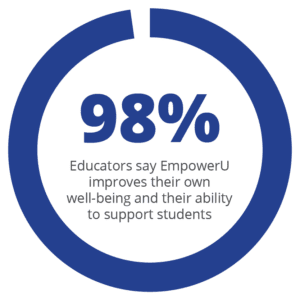Written by Catapult Learning, info@catapultlearning.com
Mental wellness and well-being have become hot topics in the education world. It’s no wonder, given that 80% of U.S. students report feeling stressed sometimes or often, while 34% felt depression, according to the Anxiety and Depression Association of America. On top of that, 59% of teachers experience burnout, compared to 48% of people in other professions. To summarize: There is currently a lot of stress in American classrooms. But there are ways to help. In this article, we’ll look at a few of the mental wellness services offered by Catapult Learning and how they can help both educators and students address wellness in the classroom.
1. Educator Well-Being Professional Development
If you’ve ever been on a flight, you’re probably aware of the instructions the flight attendants recite for passengers—so you’re likely familiar with the one about the oxygen mask. “In the event of an emergency, place your own oxygen mask on your face before you assist others.” That analogy applies to the mental well-being of educators. Teacher wellness must be addressed so educators are in the right mindset and headspace to effectively help students.
Why?
Teacher mental well-being has been directly associated with higher student engagement and fewer student psychological difficulties…not to mention better teacher retention rates. Put simply, if you take care of your educators, they can effectively take care of your students. And they’re more likely to stay for the long term.
That’s where educator wellness professional development comes in—and this differs from the standard educator professional learning that most teachers participate in at some point during their careers. PD that focuses solely on the wellness of teachers can be quite effective in re-engaging educators with their love of the profession, inspiring them to embrace new and better instructional methods and better communicate with their students so they experience classroom success.

Catapult’s new EmpowerU Educator Resilience and Mental Health Training professional development course is an evidence-based training proven to improve educator wellness, so teachers can be at their best for their students. The course is designed to equip educators with practical tools for:
- Promoting resilience
- Modeling pro-social behaviors
- Fostering classroom success
The course’s convenient, self-paced learning format allows teachers and staff to work through engaging online lessons at their own pace from nearly any device while enhancing their well-being and rekindling their sense of purpose and commitment to work. Educators can also benefit from personalized guidance and coaching to reinforce the learning.
When your educators are content, feeling refreshed and confident and are inspired to teach, your students are the beneficiaries.
To learn more about our Educator Well-Being professional development course, visit https://empoweru.education/professional-development/.
2. Tier 2 Interventions with Coaching
With student motivation, behavior and mental health needs at an all-time high, the well-being and re-engagement of struggling students are critical. Catapult Learning now offers proven, data-driven Tier 2 interventions that build educator capacity and drive academic outcomes.
For students in grades 3-12 who are struggling with non-academic barriers to success, like anxiety, depression and ADHD, our evidence-based Tier 2 interventions provide 15- to 20-minute online skill-building lessons that students can access on any device. To reinforce each lesson, students receive highly personalized support and feedback from their 1:1 instructor after each lesson.
Our highly trained instructors, who are equipped to deliver high dosages of asynchronous, one-to-one encouragement and support online, help students connect the concepts in each lesson to their lives and goals in meaningful ways, resulting in improved engagement, motivation, well-being, confidence, resilience and academic outcomes.
The Tier 2 intervention program collects pre- and post-data to monitor growth and completion rates. Notably, more than 90% of students who complete our Tier 2 course do not require further escalation to more expensive, intensive services and interventions.
Student Outcomes at Tier 2

We recommend that students participate in two 20-minute digital lessons per week, for at least six weeks, complemented with one-to-one asynchronous coaching and support after each lesson. The program is designed to be turnkey and to seamlessly fit into existing MTSS and PBIS frameworks.
To learn more about our Tier 2 interventions with coaching, visit https://empoweru.education/tier-2-support/.
3. Family Engagement
Because K-12 student stress and anxiety levels are so high, family engagement is more important than ever. Research from the Office of Early Childhood Development shows that strong family engagement is central in promoting children’s healthy development and wellness, including emotional and behavioral development, preparing children for school, seamlessly transitioning them to kindergarten and supporting academic achievement in elementary school and beyond.
One of the keys to successful family engagement is educators and parents building strong, trusting relationships so all parties understand what their kids/students are going through and so there’s recognition of the generational differences in how the topic of mental health is approached and discussed.
To establish a solid foundation of family engagement, however, parents need the right mental health resources to equip their children with the skills and strategies to self-regulate and manage their emotions.
Enter Thriving Together, our family engagement program that helps busy families learn valuable resilience skills to increase calm, improve behaviors and establish healthy communication. Thriving Together offers portable lessons that teach vital resilience concepts to both parent and child—together at home.
We offer two levels of Thriving Together:
- Pre-K through 5th Grade Families
- For families with young children, Thriving Together helps caregivers and their children build awareness, sound decision making and self-regulation skills.
- 6th through 12th Grade Families
- For families with teenagers, Thriving Together teaches skills to help conquer anxiety, self-doubt and low motivation. Together, families learn to set and achieve goals, foster healthier habits and strengthen family bonds.
Thriving Together offers both at-home learning activity books as well as online curriculum that encourage parents and children to work collaboratively.

At-Home Resilience Learning: Our at-home learning activity books deliver effective skill-building lessons proven to increase coping and self-regulation. Each engaging, 10-minute lesson, featuring activities and links to videos and digital storybooks, is completed by parents and children together.
Online Curriculum: Families who want more in-depth learning can access Thriving Together’s online curriculum that aligns with the at-home learning activity book. The online content expands on topics using additional lessons and activities to solidify learning of vital family resilience skills.
Plus, our companion Thriving Together Learning Bag offers families even more tools to increase calm, coping and self-regulation, with fun interactive activities and a family workbook with access to weekly digital lessons that teach resilience strategies for the entire family.
To learn more about our Thriving Together family engagement, visit https://empoweru.education/family-engagement/.
How Catapult Learning Can Help
At the end of the day, student success and well-being are what’s most important. And for students to experience that success in the classroom, their mental wellness needs must be addressed. Which requires teachers’ mental wellness needs to be addressed as well. Catapult Learning is here to provide your district and schools with a holistic approach to mental well-being solutions for both educators and students.

